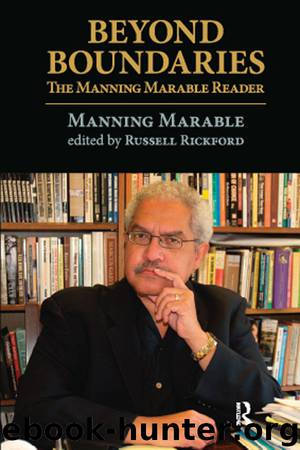Beyond Boundaries: The Manning Marable Reader by Marable Manning

Author:Marable, Manning [Marable, Manning]
Language: eng
Format: epub
Tags: Politique, Sociologie, Histoire, Racisme, Etats-Unis, XXe siècle, XXIe siècle, Afro-Américains
ISBN: 9781317263241
Amazon: B018W7ROFG
Publisher: Routledge
Published: 2015-12-02T23:00:00+00:00
Radicalism is a relative term and three decades hence may pronounce the radicals of today as the reactionaries of tomorrow.
—A. Philip Randolph, Messenger, March, 1919
Asa Philip Randolph was the most influential black trade unionist in U.S. history. Most social historians would argue that Randolph was, perhaps next to W.E.B. Du Bois, the most important Afro-American socialist of the twentieth century. His accomplishments in the fields of black union organizing, militant journalism and political protest were unequaled for decades. His controversial newspaper, the Messenger, was the first socialist journal to receive a widespread hearing among black working and middle-class people. In 1941 he led the first Negro March on Washington Movement to protest racial discrimination in federal hiring policies, establishing a precedent which was to be revived over two decades later at the high point of the Civil Rights Movement. Early in his productive career, Randolph had earned the hatred and fear of the capitalist elite and federal government officials. Not for nothing did President Woodrow Wilson refer to the black socialist leader as “the most dangerous Negro in America.”
Later in life, Randolph’s contributions to the Afro-American freedom struggle came under severe criticism from many quarters. Young black industrial workers in the late 1960s condemned Randolph and other trade union leaders for not representing their problems and vital interests. To the black activists in the League of Revolutionary Black Workers, he came to represent a modern Booker T. Washington without the Tuskegee educator’s acumen for political compromise and power. In 1968 when blacks demanded greater decision-making authority in New York’s Public School system and charged the United Federation of Teachers (U.F.T.) with racism, Randolph heartily defended the U.F.T. and its leader, Albert Shanker. In 1976 he lent his support to Daniel Patrick Moynihan, a conservative, racist Democrat, when the latter was running for the U.S. Senate in New York. Randolph’s image as a radical socialist and militant trade unionist had been utterly erased. Upon his death in May 1979, Vice President Walter Mondale glorified the black leader, declaring that “America can speak out for human rights around the world, without hypocrisy, because of the faith A. Philip Randolph … showed in our country.”
Thus, we approach the great legacy of Randolph with some sadness and uncertainty. So many questions are left unanswered by the path of his brilliant and yet contradictory career. Some Marxists suggest that the “decisive break” in Randolph’s career occurred in 1919, when he parted company with other black socialists like Grace Campbell, Cyril V. Briggs and Frank Crosswaith, who joined the fledgling Communist Party. “The issue was clear cut,” argued Irwin Silber of the New York Guardian, “not support for socialism in general or in the abstract, but support for and defense of the Bolshevik revolution.” Randolph’s decision to choose “the path of social democracy” was “the decisive turning point in a political life devoted to preventing revolutionary forces from winning leadership of the black liberation struggle.”1 As we shall observe, this split was nowhere nearly as decisive as Silber or others suggest.
Download
This site does not store any files on its server. We only index and link to content provided by other sites. Please contact the content providers to delete copyright contents if any and email us, we'll remove relevant links or contents immediately.
| Anthropology | Archaeology |
| Philosophy | Politics & Government |
| Social Sciences | Sociology |
| Women's Studies |
Nudge - Improving Decisions about Health, Wealth, and Happiness by Thaler Sunstein(7707)
The Fire Next Time by James Baldwin(5446)
iGen by Jean M. Twenge(5416)
Adulting by Kelly Williams Brown(4574)
The Sports Rules Book by Human Kinetics(4387)
The Hacking of the American Mind by Robert H. Lustig(4383)
The Ethical Slut by Janet W. Hardy(4253)
Captivate by Vanessa Van Edwards(3839)
Mummy Knew by Lisa James(3693)
In a Sunburned Country by Bill Bryson(3542)
The Worm at the Core by Sheldon Solomon(3487)
Ants Among Elephants by Sujatha Gidla(3467)
The 48 laws of power by Robert Greene & Joost Elffers(3291)
Suicide: A Study in Sociology by Emile Durkheim(3022)
The Slow Fix: Solve Problems, Work Smarter, and Live Better In a World Addicted to Speed by Carl Honore(3009)
The Tipping Point by Malcolm Gladwell(2922)
Humans of New York by Brandon Stanton(2873)
Get What's Yours for Medicare: Maximize Your Coverage, Minimize Your Costs by Philip Moeller(2732)
Handbook of Forensic Sociology and Psychology by Stephen J. Morewitz & Mark L. Goldstein(2705)
